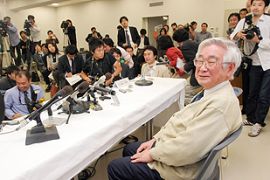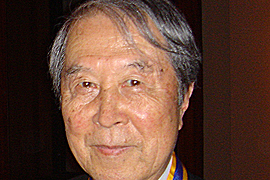Three share Nobel prize in physics
Japanese duo and US scientist share the award for their work on particle physics.

Nambu, 87, from the University of Chicago, is a US citizen but was born in Japan.
He won half of the $1.4mn prize for the discovery of a mechanism called spontaneous broken symmetry.
Kobayashi, 64, works at the KEK Laboratory, Tsukuba, Japan; while Maskawa, 68, is affiliated to the University of Kyoto, Japan.
They each shared the other half of the prize for discovering the origin of the broken symmetry that predicted the existence of at least three families of quarks in nature – now known as “up” and “down”; “charm” and “strange”; “top” and “bottom”.
Idea of symmetry
In physics, the idea of symmetry refers a kind of equality or equivalence in a situation.
At the subatomic level, for example, particles should behave like their alter egos, called antiparticles. If any of these rules is violated, the symmetry is broken.
Nambu formulated a mathematical description of spontaneous broken symmetry into particle physics in 1960.
 |
| Nambu said he “had almost given up” on winning the Nobel Physics Prize [AFP] |
According to the Nobel jury, “spontaneous broken symmetry is said to conceal nature’s order under an apparently jumbled surface”.
The Nobel citation said Nambu’s theories now permeate the Standard Model
of physics, which is the basic theory of how the universe operates and help explain why different particles have different masses.
In 1972, Kobayashi and Maskawa explained why an experiment eight years
before had found that some subatomic particles called kaons failed to follow
the rules of symmetry.
Their explanation predicted the existence of three unknown subatomic particles called quarks. In fact, scientists discovered those predicted particles between 1974 and 1994.
Kobayashi and Maskawa also predicted that symmetry would be broken in the
behavior of other particles, and as early as 2001, scientists confirmed that prediction, too.
‘Not thrilled’
Nambu said he was awakened by the academy, which called to tell him about the prize.
“I was surprised and honored. I didn’t expect it. I’ve been told for many years that I was on the list [to get the award] … I had almost given up,” he said.
Kobayashi was interrupted during his news conference, several times by a phone call from Taro Aso, the Japanese prime minster, who congratulated the professor.
 |
| Kobayashi was congratulated by the Japanese prime minister on the phone [AFP] |
“I wasn’t expecting the prize,” Kobayashi said.
In a separate news conference at his university, Maskawa said: “As a scientist, I am not thrilled by the prize.’
“I was happier when our findings were acknowledged around 2002. The Nobel
prize is a rather mundane thing.”
The last Japanese citizen to win the physics prize was Masatoshi Koshiba from the University of Tokyo in 2002.
The 2008 prize is “recognizing one of the most basic and fundamental aspects of existence,” Phil Schewe, a physicist and spokesman for the American Institute of Physics in College Park, said.
“Nature works in strange ways, and these three physicists helped to explain that strangeness in an ingenious way.”
On Monday, three European scientists won the Nobel Prize in medicine for separate discoveries of viruses that cause Aids and cervical cancer.